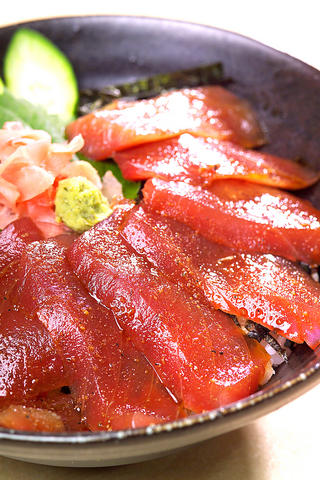The quality of a restaurant's rice can say much about its attitude toward the food it serves. In the case of Rice Cafe, a new establishment that opened last week specializing in Japanese "rice bowl" or donburi dishes (日式蓋飯), rice is given a high priority, and contributes as much to the enjoyment of the meal as the meat and vegetables that it accompanies.
Donburi are an option on virtually every Japanese restaurant menu. Made up of rice with a topping of fish, meat and vegetables, they are simple and filling. Rice Cafe has made a specialty of these dishes, and while it includes all the most common, such as oyakodon (egg, chicken and onion stew over rice, NT$130), katsudon (a pork cutlet and sauce on rice, NT$180), and tendon (tempura shrimp and vegetables on rice, NT$180), it also has many that are not so readily available.
Whether common or unusual, all the donburi are served over high quality koshihikari rice (越光米), which has an excellent texture; even when eaten plain it has a sweet flavor and is fragrant. This rice, which originates from Niigata, Japan, and which is now grown in Taiwan, has the same standing in Japanese cuisine as basmati rice has in Indian.

PHOTOS: COURTESY OF RICE CAFE
Apart from the rice, the second thing that distinguishes the donburi served at Rice Cafe is the care taken over the ingredients for the toppings. The restaurant has not shied away from placing its price point slightly above that of donburi in many Japanese chain restaurants, but you certainly get your money's worth. A case in point is the steak donburi, which, priced at NT$350, includes a nice piece of Australian prime fillet, grilled and sliced, which is served with a sauce of minced onion cooked in pan juices. The dish reflects a sophisticated appreciation of the ingredients used. Even the baby corn and mushrooms served as a garnish are cooked with a slight taste of the grill, but still very crisp and full of freshness. It is highly recommended as a light meal and more than a match for Taipei's traditional steakhouses.
The steak donburi, and a number of other higher-priced items such as the marinated raw tuna donburi (NT$280) and the salmon and roe donburi (NT$300) are only available in limited quantities and can quickly sell-out.
According to Brooke Tseng (曾子倫), who oversees operations at Rice Cafe, one of the most popular dishes is the deep-fried seafood donburi (NT$180), which is widely available in Japan but rarely seen in Taiwan.
The company behind Rice Cafe also operates the Rakumenya (樂麵屋) ramen restaurant next door, which has already proved successful by offering authentic Japanese flavors, distinct from Taiwanese-style Japanese food.
Each donburi comes with a bowl of miso soup and some pickled vegetables. A small array of beverages is on offer, but the soup, made from Japanese white miso, is sufficiently tasty and refreshing to wash down the meal.

May 18 to May 24 Pastor Yang Hsu’s (楊煦) congregation was shocked upon seeing the land he chose to build his orphanage. It was surrounded by mountains on three sides, and the only way to access it was to cross a river by foot. The soil was poor due to runoff, and large rocks strewn across the plot prevented much from growing. In addition, there was no running water or electricity. But it was all Yang could afford. He and his Indigenous Atayal wife Lin Feng-ying (林鳳英) had already been caring for 24 orphans in their home, and they were in

On May 2, Chinese Nationalist Party (KMT) Chairman Eric Chu (朱立倫), at a meeting in support of Taipei city councilors at party headquarters, compared President William Lai (賴清德) to Hitler. Chu claimed that unlike any other democracy worldwide in history, no other leader was rooting out opposing parties like Lai and the Democratic Progressive Party (DPP). That his statements are wildly inaccurate was not the point. It was a rallying cry, not a history lesson. This was intentional to provoke the international diplomatic community into a response, which was promptly provided. Both the German and Israeli offices issued statements on Facebook

Even by the standards of Ukraine’s International Legion, which comprises volunteers from over 55 countries, Han has an unusual backstory. Born in Taichung, he grew up in Costa Rica — then one of Taiwan’s diplomatic allies — where a relative worked for the embassy. After attending an American international high school in San Jose, Costa Rica’s capital, Han — who prefers to use only his given name for OPSEC (operations security) reasons — moved to the US in his teens. He attended Penn State University before returning to Taiwan to work in the semiconductor industry in Kaohsiung, where he

Australia’s ABC last week published a piece on the recall campaign. The article emphasized the divisions in Taiwanese society and blamed the recall for worsening them. It quotes a supporter of the Taiwan People’s Party (TPP) as saying “I’m 43 years old, born and raised here, and I’ve never seen the country this divided in my entire life.” Apparently, as an adult, she slept through the post-election violence in 2000 and 2004 by the Chinese Nationalist Party (KMT), the veiled coup threats by the military when Chen Shui-bian (陳水扁) became president, the 2006 Red Shirt protests against him ginned up by